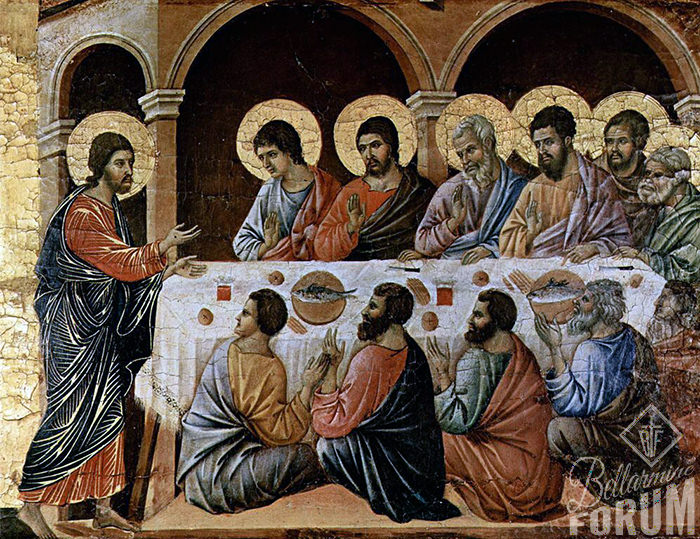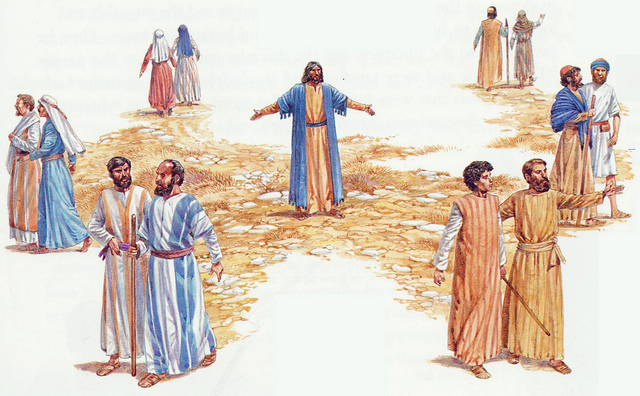 Singing in the liturgy has always been of the utmost importance even from the earliest days of the Church. Sing to the Lord: Music in Divine Worship says this: “Obedient to Christ and to the Church, we gather in liturgical assembly week after week. As our predecessors did, we find ourselves ’singing psalms, hymns, and spiritual songs with gratitude in our hearts to God’ (Col 3:16). … Music ’makes the liturgical prayers of the Christian community more alive and fervent so that everyone can praise and beseech the Triune God more powerfully, more intently and more effectively’” (no. 5). Therefore, it is no surprise that there are many instances of song in the Church’s Sacred Liturgy. Each liturgical celebration—the Mass, Liturgy of the Hours, and/or a Sacrament—all have moments of communal song. The General Instruction of the Roman Missal (GIRM) notes, “Singing is the sign of the heart’s joy (cf. Acts 2:46). Thus St. Augustine says rightly, ‘Singing is for one who loves,’ and there is also an ancient proverb: ‘Whoever sings well prays twice over’” (no. 39). When we gather, each single voice joins with our brothers and sisters’ voices to amplify our praise and our love for God and neighbor.
Singing in the liturgy has always been of the utmost importance even from the earliest days of the Church. Sing to the Lord: Music in Divine Worship says this: “Obedient to Christ and to the Church, we gather in liturgical assembly week after week. As our predecessors did, we find ourselves ’singing psalms, hymns, and spiritual songs with gratitude in our hearts to God’ (Col 3:16). … Music ’makes the liturgical prayers of the Christian community more alive and fervent so that everyone can praise and beseech the Triune God more powerfully, more intently and more effectively’” (no. 5). Therefore, it is no surprise that there are many instances of song in the Church’s Sacred Liturgy. Each liturgical celebration—the Mass, Liturgy of the Hours, and/or a Sacrament—all have moments of communal song. The General Instruction of the Roman Missal (GIRM) notes, “Singing is the sign of the heart’s joy (cf. Acts 2:46). Thus St. Augustine says rightly, ‘Singing is for one who loves,’ and there is also an ancient proverb: ‘Whoever sings well prays twice over’” (no. 39). When we gather, each single voice joins with our brothers and sisters’ voices to amplify our praise and our love for God and neighbor.
Among all the different parts of the Mass, there are three “chants” mentioned in the GIRM: Entrance, Offertory, and Communion. In this context, “chant” means any sort of song whether it be a hymn, canticle, litany, chant, etc. These songs are meant to foster the unity of those gathered and accompany the liturgical action taking place (cf. GIRM 48). Interestingly, there is no mention of a final song in the GIRM. That said, it has been a centuries-long custom in the Church to have some type of music at the end of the Mass. Its purpose is to bring a fitting close to the celebration of the Lord’s Paschal Mystery and accompany the liturgical action taking place: the exit of the ministers.
 So while it is fairly common for people to refer to the Entrance, Offertory, and Communion Chants by the aforementioned titles, the final song has many different monikers. The most common are probably “Recessional”, “Closing”, or “Sending”. Before I make my case for which I prefer and why, I will state that none of these titles are wrong; however, they do foster different perspectives. For most of my life, I referred to it as the “Recessional” which again, is not a bad description—after all, it seems to be the opposite of the processional. My referring to it as the recessional changed a few years ago when a fellow music director said something along these lines: “Catholics don’t recess. We don’t go backward—we’re sent forth to change the world.” What a change in mindset! Since that time forward, I have referred to it as the “Sending Forth.” Two options of the dismissal given by the priest or deacon are: “Go and announce the Gospel of the Lord,” or “Go in peace, glorifying the Lord by your life.” There is definitely no mention of going backward!
So while it is fairly common for people to refer to the Entrance, Offertory, and Communion Chants by the aforementioned titles, the final song has many different monikers. The most common are probably “Recessional”, “Closing”, or “Sending”. Before I make my case for which I prefer and why, I will state that none of these titles are wrong; however, they do foster different perspectives. For most of my life, I referred to it as the “Recessional” which again, is not a bad description—after all, it seems to be the opposite of the processional. My referring to it as the recessional changed a few years ago when a fellow music director said something along these lines: “Catholics don’t recess. We don’t go backward—we’re sent forth to change the world.” What a change in mindset! Since that time forward, I have referred to it as the “Sending Forth.” Two options of the dismissal given by the priest or deacon are: “Go and announce the Gospel of the Lord,” or “Go in peace, glorifying the Lord by your life.” There is definitely no mention of going backward!
I have argued in a couple presentations I have given here over the years that the dismissal is the third most important part of the Mass (the first, if we are able to receive, is the reception of Holy Communion, and the second is encountering Christ in the Word). But the first two have little meaning if we do not go forth and share who and what we have experienced! If what we celebrate in church stays in church, the world will not be changed. If we leave the same person as we were when we entered, maybe “recessional” is accurate. But, if we go forth transformed by the Lord whom we have encountered, our part of the world cannot help be changed because Christ’s light shines in us. As we are sent forth, our voices join together in praise of our Risen Lord and our communal song is the hymn which sustains us through the week until we gather again. Sing to the Lord describes it well with the Scripture passage from Isaiah quoted in the Gospel today:
(the first, if we are able to receive, is the reception of Holy Communion, and the second is encountering Christ in the Word). But the first two have little meaning if we do not go forth and share who and what we have experienced! If what we celebrate in church stays in church, the world will not be changed. If we leave the same person as we were when we entered, maybe “recessional” is accurate. But, if we go forth transformed by the Lord whom we have encountered, our part of the world cannot help be changed because Christ’s light shines in us. As we are sent forth, our voices join together in praise of our Risen Lord and our communal song is the hymn which sustains us through the week until we gather again. Sing to the Lord describes it well with the Scripture passage from Isaiah quoted in the Gospel today:
The Paschal hymn, of course, does not cease when a liturgical celebration ends. Christ, whose praises we have sung, remains with us and leads us through church doors to the whole world, with its joys and hopes, griefs and anxieties. The words Jesus chose from the book of Isaiah at the beginning of his ministry become the song of the Body of Christ. ‘The Spirit of the Lord is upon me, because he has anointed me to bring glad tidings to the poor. He has sent me to proclaim liberty to captives and recovery of sight to the blind, to let the oppressed go free, and to proclaim a year acceptable to the Lord’” (no. 8).
Whichever term we use to describe the final song, may our mindset and actions reflect that we are sent forth!


Comments
There are no comments yet - be the first one to comment: